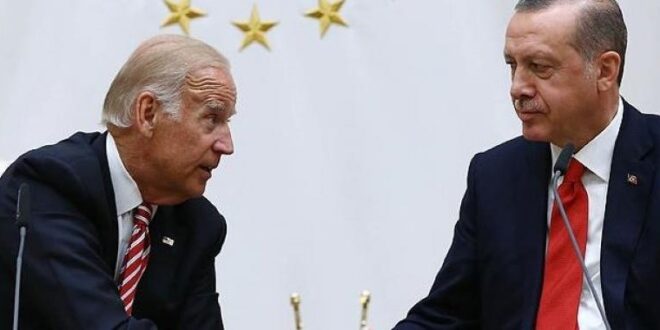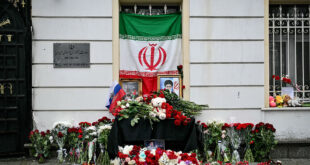Turkey’s relations with the US have suffered a blow, but the US needs to understand that in a changing world, regional stability cannot be achieved without Turkish cooperation.
One cannot say that Turkey–US relations have been a smooth ride these past seven years. Although this has been an exceptional time, bilateral relations between the two countries have hit many a tough curve since US President Lyndon Johnson’s letter over Cyprus in 1964, which warned the then-Turkish government against ‘military interference’ on the island.
However, never before has the relationship been as strained as it is now in the context of US military aid to the Syrian branch of the PKK terrorist organisation, which constitutes a primary national security threat for Turkey. Never before has Turkey found itself in such a pivotal role as the US attempts to draw a global ring of ‘like-minded’ states and allies closer to itself to distance Russia, with great power rivalry making a comeback. Never before was Turkey able to shape regional realties on the ground to this extent, as the first realignment of great power relations since the end of the Second World War is unfolding. Turkey’s role in Libya, Syria, Iraq and more recently in support of Azerbaijan in its fight against Armenian occupying forces in Nagorno-Karabakh has to be seen within this wider picture of global change.
As Turkey emerges as a more independent, assertive player, its regional influence not only opens new areas of cooperation but also disturbs its old allies, who would at least like to see their traditional alliances remaining unchanged in an unsettling, unpredictable world. But the fallacy in that expectation is assuming that those close to us will remain the same as the world changes. In reality, Turkey’s transformation from a ‘functional ally’ – one that was seen by the US only within the parameters of its unique attributes (having an important geostrategic location and the second largest army in NATO) – to a regional actor that could make a difference ‘on the ground and at the table’ was happening long before these past seven troublesome years.
Issues of Contention
One of the present issues of contention between the two NATO allies – Turkey’s purchase of the Russian S-400 air defence system – has to be seen within this wider framework. Had the issue been confined only to the technological concerns the US had over the proximity of the Russian system to US equipment, Turkey’s efforts to address these concerns would not have gone unanswered. Indeed, even the name of the sanctions imposed on Turkey attests to the US’s concern over Turkey’s purchase being more political-strategic than military-strategic.
The so-called CAATSA sanctions incorporate the aptly named piece of legislation ‘Countering Russian Influence in Europe and Eurasia’. While the US is intent on ensuring that ‘all US allies and partners, avoid future purchases of Russian weaponry’, it is evident that Turkey’s creation of a precedent for others who may be toying with the idea of buying Russian systems is far more disturbing than any technological challenge posed by Russian systems operating adjacent to US ones. The fact that Turkey was driven to this decision because of a serious gap in its air defence capabilities that it was not allowed to meet by purchasing the US Patriot system seems to have been overlooked.
Furthermore, if this caused resentment in Turkish circles, the ongoing harbouring by the US of the leader of a group Turkey defines as a terrorist organisation and which it holds responsible for the failed coup of 2016 is a far more serious matter. Therefore, the present unresolved issues between Turkey and the US are of a more existential nature in terms of Turkey’s perceived national security threats, and are more wide-reaching than previous rifts in the context of a global power shift.
It was at this point of fragility in Turkey–US relations that President Biden unfortunately decided to go where his predecessors had wisely chosen not to. By recognising the events that transpired in 1915 in the Ottoman Empire as a ‘genocide’, President Biden became the first US president to declare formal recognition of the term regarding the events of 1915. Former President Ronald Reagan had previously used the term within a different context – not in a formal commemoration statement – and other presidents, even if they pledged to recognise the term in their election campaigns, refrained from doing so once in office.
Turkey’s Position on the Events of 1915
Turkey does not deny the suffering of Armenians during the First World War. In fact, President Erdoğan sent a message on 24 April to the Armenian Patriarch of Turkey, the Reverend Sahak Mashalyan, offering his condolences to the families of Ottoman Armenians who were killed during the tragic events of the First World War. The message also reiterated Turkey’s call for enhanced relations with neighbouring Armenia. No-one doubts the pain suffered by those caught up in the circumstances of that particular time, or the sincerity of the pain that lingers in the memory of relatives.
But the word ‘genocide’ denotes a very serious accusation and because of the gravity of the term, it must be fully supported in legal and historical fact. This is not the case in terms of the events of 1915. The term ‘genocide’ was recognised in the legal framework for the first time in 1948. The UN has not taken up consideration of describing the events of 1915 as ‘genocide’ because they happened before the term was defined in international law.
Furthermore, the UN Convention of 1948 explicitly states that actions have to be perpetrated with the ‘intent to destroy’ a particular group based on national, ethnic or religious identity. First of all, there is no evidence indicating a deliberate intent to ‘destroy’ Armenians because they belonged to a group. Armenian units had allied themselves with the invading Russian forces in an uprising against the Ottoman Empire.
Atrocities on a mass scale were carried out by Armenian gangs against Muslim civilians in Anatolia, a historical fact that is often conveniently not referred to. Armenian villages were also attacked by locals. The Ottoman government sent in the army to maintain law and order. Those responsible for the uprising were deported only from the area of the war zone for security reasons. Therefore, it is impossible to define the situation as ‘genocide’ in legal terms. In historical terms, there is a lack of scholarly consensus on the events that transpired. There are historians who do not accept the term ‘genocide’ in referring to the events of 1915, among them Stanford Shaw, Bernard Lewis and Justin McCarthy. It is for this reason that President Erdoğan proposed the establishment of a Joint Historic Commission and the opening of all archives in Turkey and Armenia in 2005. Unfortunately this offer was not taken up.
Therefore, when the term – which is not backed up in concrete legal or historical terms – is used by politicians, it becomes problematic, because it is not up to politicians to pass judgement on the issue. This does nothing more than sour the already fragile bilateral relationship and prevent the establishment of sustainable regional peace and stability, including in Turkey’s relations with Armenia. It is also unfortunate that the US is unable to see Turkey’s growing regional influence as an asset for furthering stability.
Turkey’s Broader Relations
Turkey has a compartmentalised relationship with Russia based on realpolitik, which enables Turkey to both cooperate with and restrain Russia in Syria and also in Libya. Turkish support to Azerbaijan in the Caucasus, particularly in the use of drones that are changing the face of warfare, has shifted the situation on the ground for the first time in 30 years, resulting in the de facto implementation of UN Security Council Resolutions in what was otherwise a frozen conflict.
This has rendered the Minsk Group ineffective, with Turkey also proposing a new six-way Caucasus platform for regional peace and stability consisting of Turkey, Russia, Azerbaijan, Georgia, Iran and Armenia. Turkey’s role as a strategic partner to Ukraine is also crucial for regional stability. The OSCE Special Monitoring Mission to Ukraine has been headed by two consecutive Turkish ambassadors, and the establishment of a new Turkish-Ukrainian platform involving the countries’ foreign and defence ministers will further strengthen cooperation in the area of defence. Turkey’s backing of the Crimean Platform not only asserts its support for the Crimean Tatar population but also underlines its rejection of the annexation of Crimea by Russia and its commitment to the sovereignty and territorial integrity of Ukraine.
In Afghanistan, Turkey has twice taken on the role of commanding the International Security Assistance Force and played an important role in NATO’s Resolute Support Mission. Turkey is also hosting the Istanbul Conference on the Afghan peace process to complement and accelerate the talks being held in Doha. In Syria, Turkey has singlehandedly recaptured a larger area from ISIS than any other member of the international coalition. And today, Turkey actively participates in many NATO missions, the most significant being its taking over the command of NATO’s Spearhead Very High Readiness Joint Task Force in 2021.
With a declining liberal order that no longer has the capacity to safeguard global stability, and with the US seeking alternative modes of international cooperation – be it an alliance of democracies to keep Russia and China at bay, or a Concert of Powers including Russia and China – Turkey will have to be involved somewhere, either as a strategic partner, or as a pivotal actor that can make a difference.
In this state of affairs, there is absolutely no logic behind President Biden’s acknowledgement of something that is disputed, sensitive and historically and legally unfounded.
Healing Wounds
Meanwhile, as the door is left open for healing present rifts at the meeting expected to take place between President Erdoğan and President Biden at the NATO Summit in June, it is perhaps also pertinent to remind the present US administration that anti-US sentiment in Turkish public opinion is at an all-time high. President Biden’s recent statement has done nothing but increase disapproval of the US that is shared across a majority of Turkish society. In fact, this was reflected in the resolution passed by the Turkish Parliament, which rejected and declared null and void the statement made by President Biden. The resolution was passed with an overwhelming majority, with the backing of all four major political parties.
The lasting effects of this damage to Turkey–US relations speak for themselves. This is not just about governments having profound disagreements with each other about certain issues. This is about an issue that is highly sensitive for the Turkish population. It goes beyond politics, and therefore should not be made a tool of political interests, whether it be for the satisfaction of one lobby or another.
On the other hand, if we look at the wider interests of the US government beyond its domestic political lobbies, if Turkey was too important to ‘lose’ back in the day when presidents chose tact over populism and treaded carefully around this sensitive matter, keeping the Turkey–US strategic partnership should be all the more important for the US in today’s more unpredictable world with its plethora of challenges.
James Jeffrey, a former US Ambassador to Turkey who knows the ins and outs of the relationship very well, recently stated that ‘If the Biden administration, so concerned about re-establishing American global leadership, seriously wants to confront these threats, it can’t succeed without Turkey’.
 Eurasia Press & News
Eurasia Press & News




